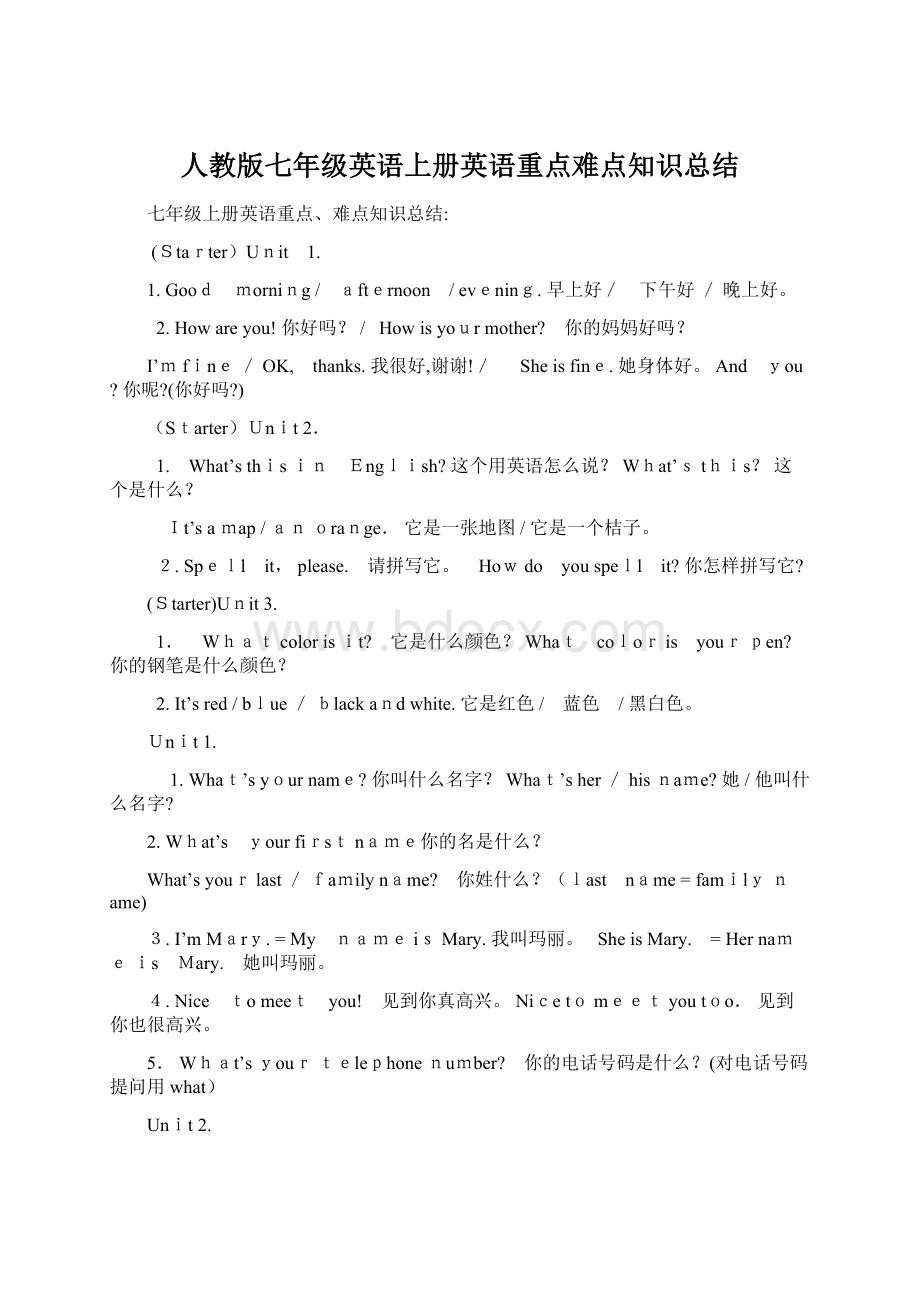人教版七年级英语上册英语重点难点知识总结Word格式文档下载.docx
《人教版七年级英语上册英语重点难点知识总结Word格式文档下载.docx》由会员分享,可在线阅读,更多相关《人教版七年级英语上册英语重点难点知识总结Word格式文档下载.docx(9页珍藏版)》请在冰豆网上搜索。

(last name=familyname)
3.I’mMary.=My nameisMary.我叫玛丽。
SheisMary. =Hernameis Mary. 她叫玛丽。
4.Nice tomeet you!
见到你真高兴。
Nicetomeetyoutoo.见到你也很高兴。
5.What’syourtelephonenumber?
你的电话号码是什么?
(对电话号码提问用what)
Unit2.
1.Excuseme. 打扰了。
Is this/thatyour pencil?
这个/ 那个是你的铅笔吗?
Yes,it is./No,itisn’t.是的,它是。
/不,不是。
(回答时常用it替代上文中的this和that)
2.This/Thatismyruler.这个/ 那个是我的尺子。
3.Please callMary at 495-3539.请给Mary 打电话:
495-3539.(callsb at+ 电话号码)
PleasecallMary.请给Mary打电话。
Pleasecall 495-3539.请拨打495-3539.
4.本单元短语:
callsbat +电话号码(at译为“按照”,此短语意思是“按照某个电话号码给某人打电话)
pencilcase文具盒computergame电脑游戏
lost andfound失物招领 lost andfoundcase失物招领箱
Unit3.
1. This/ Thatis mysister. 这位/ 那位是我的姐姐。
此句的复数形式是:
These/Thosearemysisters.这些/那些是我的姐姐们。
(this/that的复数分别是these /those)
2.Itisa watch.复数形式是:
Theyaresomewatches.
(he/she/it复数都是they,和this/that的复数不同)
3.Ishe/Guo Peng your brother?
他/郭鹏是你的哥哥吗?
Yes, he is./No, heisn’t. 是的,他是。
/不,他不是。
4.Thanks forthephotoof your family. 感谢你寄来你的家庭照(全家福)。
句中thanks =thankyou,
另外thephotoofyourfamily= your family photo
5.Here ismyfamily photo.这儿是我的家庭照。
Here are somebooks.这儿有一些书。
Thereis apictureand threepencilsonthedesk.桌子上有一幅画和三支铅笔。
Therearemanyphotos inthedrawer.
抽屉里有许多照片。
(here /there 后的be动词单复数形式要以紧随其后的名词单复数来定)
Unit4.
1.Whereismybackpack?
我的背包在哪儿?
Where arethebooks?
那些书在哪儿?
2.It’s/They’re inthedrawer/underthebed/ onthebookcase.
它/它们在抽屉里/床底下/书柜上。
(注意主语和be动词照应)
3.Is it/Isthebook/ Aretheyonthe bed/in thebackpack/underthedesk?
它/这本书/它们在床上/背包里 /桌子下吗?
4.Canyoubring somethings to school?
你能带些东西去学校吗?
some一般用在肯定的陈述句中,any用在否定句(“任何”)或疑问句(“某些,一些”)中。
但如果表示期待对方肯定的回答或表请求和建议,疑问句中常用some。
如上句。
5. take…to…把…带到…
Please take yoursistertoschool. 请把你的妹妹带到学校。
bring表从另一处带到这儿。
take表从这儿带到另一处。
方向正好相反。
Unit5.
1.Doyouhavea soccerball?
你有一个足球吗?
Yes, Ido. /No, Idon’t.
Doesshe havea tennisracket?
她有一个网球拍吗?
Yes, shedoes./No,she doesn’t.
(谓语是实义动词的时候,疑问句形式:
do/does提前到主语前,主语后面的动词用原形)
2.I don’thave asoccerball.我没有一个足球。
Shedoesn’thaveavolleyball.她没有排球。
(谓语是实义动词的时候,否定形式:
do/does +not+ 动词原形)
3.Letme/ him/ usplaysoccer.让我 / 他/我们踢足球吧。
(let后面的动词用原形)
4.Thatsoundsgood/great/interesting/boring.那听起来不错/好极了/有趣 /无聊。
(that指代上文之事)
5.I /We/They/You/Thekids have8baseballs. 我/我们/他们/孩子们有8个棒球。
She/ He/ Mybrother/Theboyhas 8baseballs. 她/他/我哥哥 /那个男孩有8个棒球。
(注意以上各句主语和谓语的照应:
主语是单三,谓语也用单三;
主语不是单三,谓语也不用单三。
6. 本单元短语:
tennisracket网球拍
ping-pongbat乒乓球拍
ping-pong/soccer/tennisball乒乓球/足球/网球(指物品)
playtennis/basketball/baseball/ping-pong/volleyball/soccer/football“打…,踢…”(指运动)
play computergames打电脑游戏
onTV在电视上(通过电视)
everyday每天
Unit6.
1. Doyoulikebananas/ hamburgers / salad…?
你喜欢香蕉/汉堡包/ 沙拉……吗?
Yes,Ido. /No,Idon’t.是的,我喜欢。
/不,我不喜欢。
2.likedoingsth.=liketo dosth.喜欢做某事.如:
She likeshelping /tohelpstudents. 她喜欢帮学生。
3.短语:
forbreakfast /lunch / dinner /dessert对早餐/午餐/晚餐/甜食来说
runningstar 跑步明星
lotsof =alot of ( 后既可接可数名词复数,又可接不可数名词)
healthyfood 健康食品
Unit7.
1.How much arethesepants?
=What’sthepriceofthesepants?
这条裤子多少钱?
They’re twentydollars. 这条裤子20美元。
Howmuchis thissweater?
=What’sthepriceofthissweater?
这件毛衣多少钱?
It’s60Yuan.它60元。
2.Howmuch加不可数名词,howmany加可数名词复数。
如:
howmuchfood,
howmany students
3.CanI helpyou?
我能帮你吗?
What can Idoforyou?
我能为你做什么?
4.Yes, please.是的,请吧。
No, thanks. 不了,谢谢。
5.Iwant asweater. 我想要件毛衣。
6.What colordo you want?
你想要什么颜色?
7.Hereyouare.=Hereit is给你(这件毛衣 /钱等)。
8.How muchis it?
/Howmucharethey?
多少钱?
9.I’lltakeit.=I’llgetit.=I’llhaveit. 我买下它了。
10.Thank you./Thanksalot.多谢。
You’re welcome.=That’sallright.别客气。
11.Come andbuy…=Cometobuy ….
Goandsee …= Gotosee…
12.Anybodycanaffordourprices. 任何人都能承担得起我们的价钱。
13.短语:
atagoodprice 以合理的价格
havealook(at…)“看一看(…)”=look(at…)
forgirls/boys/ sports.对姑娘/男孩/运动来说
sell…to…把…卖给…
buy…from…从…买…
onsale在出售
Unit8.
1. When is your /her/hisbirthday?
你的/她的/他的 生日是什么时候?
My/Her /HisbirthdayisMay 14th. 我的/她的/ 他的生日是5月14日。
(此处无on)
2. Howoldare you?
= What’syourage?
你多大了?
I’m8. /I’m8 yearsold.我8岁了。
3.Mondayis theseconddayoftheweek.周一是一星期中的第二天。
(序数词前常有the)
It’smyeighthbirthday. (序数词eighth前已有限定词my,故不再加the.)
4.短语:
birthdayparty生日聚会
Englishspeechcontest英语演讲比赛
musicfestival 音乐节
schoolday校庆日
schooltrip学校组织的旅行
volleyballgame排球比赛
Unit9.
1.Do you/ Doesshewanttogotoamovie?
你想/她想看电影吗?
2.Whatkindofmoviesdoyoulike?
你喜欢什么种类的电影?
3.June reallylikes action movies.琼真的喜欢动作片。
(really可修饰动词,但very不能。
4.MikeisEnglish. 迈克是英国人。
(注意English前无冠词an.)
5.Ioften go tomovieswithmyfriends. 我常和朋友一起看电影。
(with,“用;
和…一起”)
6.短语:
learn about…学习有关…的知识
Chinesehistory中国历史
on weekends.在周末
actionmovies动作片
gotoamovie去看电影
wantto do sth.想要做某事
7.语法:
并列连词and和or.都译为“和”,or常用于否定句。
and常用于肯定句。
He likes P.E.andart.他喜欢体育和美术。
=Helikes P.E. andhe likesart.
Hedoesn’t likeP.E.orart. =Hedoesn’tlikeP.E. andhedoesn’tlikeart.
(or只用于连接否定句中的短语。
若连接两个否定句时仍用and,如后一句。
Unit 10.
1.Canyouplay the guitar?
Canyoudance/swim?
你会弹吉它 /跳舞/游泳吗?
Yes, Ican./No,Ican’t.是的,我会。
/不,我不会。
2.Iwanttojoin theart /musicclub. 我想参加美术 /音乐俱乐部。
3.Whatclubdoyouwantto join?
你想参加什么俱乐部?
4.Canyouplaythepianowell?
你弹钢琴弹得好吗?
5.Areyougoodwith kids?
你善于和孩子相处吗?
(begoodwithsb. 善于和某人相处)
6.May Iknowyour name?
我可以知道你的名字吗?
=What’syourname?
7.Whatcanyou do?
你会做什么?
8. 短语:
play thepiano /thedrums/thetrumpet 弹钢琴 /打鼓/吹喇叭(乐器前有the)
chess /English/swimming/music…club象棋/ 英语/游泳/ 音乐俱乐部
alittle“一点,一些”(修饰不可数名词。
Unit11.
1.Whattimedoyou/does sheusuallygotoschool/getup?
你通常何时上学/ 起床?
Iusuallyrun/Sheusuallygetsup ataround7:
00. 我 /她通常大约7:
00跑步/起床。
2. Whendopeopleusuallyeatdinner?
人们通常什么时候吃晚饭?
3.短语:
inthemorning/afternoon/evening 在早上/下午/ 晚上(用介词in)
(若有其它修饰词,常用介词on:
onSundaymorning;
onthe evening of May 1st.)
gohome回家
gethome到家
gotobed 上床睡觉
takeashower洗澡
get up起床bestwishes致以良好的祝愿
listentomusic /me听音乐/听我(说)
alldayand allnight 整天整夜
brushteeth刷牙
taketheNo.305bustoschool乘305路车去学校
writealettertosb=writetosb=writesb.给某人写信
4.时刻表达:
1分钟未过半点;
7:
20,
可以读作:
seventwenty,
或twenty pastseven
12:
08,
可以读作:
twelveoheight,
或eightpasttwelve
2分钟刚好半点:
9:
30,
可读作:
nine thirty,
或halfpastnine
3分钟超过半点:
8:
46,
可读作:
eightforty-six,
或fourteentonine
5.what引导的感叹句的结构:
1what+a/an+形容词+ 名词+主谓
Whatacleverboy heis!
他是多么聪明的孩子啊!
Whataninterestingbookyouhave!
你的书多么有趣啊!
2what+ 形容词 +名词复数:
Whatcleverboysyouare!
你们是多么聪明的孩子啊!
3what+形容词+不可数名词:
What difficult workitis!
那是多么困难的工作啊!
6. 宾语从句的语序(用陈述句的语序,见下文画线部分):
Idon’tknow whenyourbirthdayis.(不是when isyourbirthday)
Can youtellmewhere youcomefrom?
(不是wheredoyoucomefrom)
Unit 12.
1.What’syour favoritesubject?
你最喜爱的学科是什么?
(形容词性物主代词+favorite+名词,“…最喜爱的….”)
2.Myfavoritesubjectisscience.我最喜爱的学科是科学。
3. Whydo you/doesshelike science?
你/她为什么喜欢科学?
Becauseit’sinteresting.因为它有趣。
4.Who is yourartteacher?
谁是你的美术教师?
5. When doyouhavemath?
你什么时候上数学?
6.I have volleyballfortwohours.我打排球两个小时。
(for +时间段,“达到…时间”)
7. 短语:
TV show电视节目
bestrict with sb /bestrictinsth对某人/某物要求严格
bebusywithsth/be busydoingsth忙于某事 / 做某事
on Monday/Tuesday…在周一/周二….
afterlunch /work/ school/ class…午饭后/下班后/放学后 / 下课后…
runaround 到处跑动
playwith sb/ sth和某人一块儿玩/用某物玩
人称代词形式:
主格
宾格
形容词性物主代词
名词性物主代词
反身代词
作主语
作宾语
后要再接名词
后不再接名词
主宾一致
I
me
my(pen / house...)
mine
myself
you(你)
you
your(bag /car...)
yours
yourself
he
him
his(desk/ coat...)
his
himself
she
her
her(hair/books…
hers
herself
it
it
its(tail /face...)
its
itself
we
us
our(teachers/ room...)
ours
ourselves
you(你们)
your(class/city...)
yours
yourselves
they
them
their(school /seats...)
theirs
themselves
(如果动词的施动者,即主语,和动词或介词后相应的宾格代词是相同的人或物时,
其宾格代词要用反身代词:
Iteach myselfEnglish.我自学英语。
Wesolved the problemsourselves.我们自己解决的这些问题。
Lucyhurtherselfbyaccident.露茜偶然伤了自己。
Youhavetotakecareof yourself. 你必须照看好自己。
但Sheasksmetohelp her.中的her并没有反身代词,因为help的施动者是“我”,而承受者是“她”,不相同。
Myself(自我介绍)
Hello, everyone!
(大家好。
) MynameisLiYida.(我叫李依妲)I ama girl.(我是一个女孩。
) IcomefromSichuan.(我来自四川。
)MybirthdayisApril 11th.(我的生日在4月11日。
) Myfamilyhasthreepeople。
(我家有三个人。
)Theyare my father,motherandme.(他们是我的爸爸,妈妈和我。
)Ilikesportsverymuch.(我非常喜欢运动。
)I oftenplayping-pongwith myfatherintheafternoon.(我经常在下午和我爸爸打乒乓球。
)I likeStrawberries,apples, orangesand